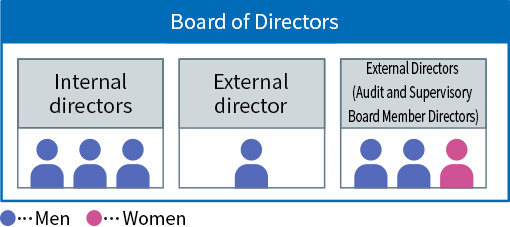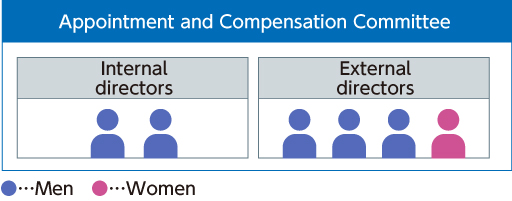Corporate governance structure
Board of Directors

The Board of Directors is comprised of seven members: three internal directors, one external director, and three external directors who also serve as Audit and Supervisory Committee members. Of these members, one is a female director, contributing to a more diverse Board composition. In addition to regular Board of Directors meetings which are held once per month in principle, extraordinary Board of Directors meetings are held as necessary. The Daiseki Group holds Board of Directors meetings more frequently with the aim of facilitating prompt and accurate decision-making and efficient organizational management of the Group as a whole.
In addition, an executive officer system has been introduced for more efficient and accelerated execution of duties as well as clearer responsibility by separating the execution function from decision making and supervisory functions of management, aiming at establishing an agile and efficient management system. Board of Directors functions as the management decision making and supervisory body, while Management Meeting serves as the business executing body based on the decision making of Board of Directors. Board of Directors decides terms stipulated by the laws, regulations, or the articles of incorporation, important matters of Daiseki and our Group companies.
Management Meeting
The Daiseki Group separates management decision making and execution of duties: Board of Directors functions as the management decision making and supervisory body, while Management Meeting serves as the business executing body based on the decision making of Board of Directors. Directors, executive officers, business site managers, directors of consolidated subsidiaries, and others attend monthly Management Meeting. Management Meeting is responsible for setting targets and budgets by business divisions, monthly and quarterly performance management, and implementation of improvement measures. Striving to establish internal control, Headquarters of Business Generalization and Headquarters of Planning and Management provide instructions and requests in the fields of compliance, respectively in the Management Meeting.
Audit and Supervisory Committee
Held on a monthly basis in general, Audit and Supervisory Committee consists of three external directors with no mutual interest with the Daiseki Group. Audit and Supervisory Committee is responsible for reporting, consultation, and resolution of important matters related to audit and other related activities.
Appointment and Compensation Committee(2021~)

Appointment and Compensation Committee, an optional advisory body of directors aiming at enhancing independency, objectivity, and accountability of the function of Board of Directors in terms of appointment, dismissal, and compensation of directors, has been established. Appointment and Compensation Committee, whose majority of members consist of independent external directors, enhances objectivity and equity in processes to determine appointment, dismissal, and compensation of directors by discussing appointment and compensation of directors as well as by providing the discussion results and relevant advice and recommendation to Board of Directors.
Accounting Audit
Daiseki has entered an audit contract with Azusa Audit Corporations, a KPMG Japan member firm, to have accounting audits and internal control report audits conducted based on the company law and the Financial Instruments and Exchange Act.
Internal Audit
Consisting of dedicated staff members, Audit Office under the direct supervision of the President and Representative Director audits the effectiveness of internal control and operational efficiency, etc. on a regular basis based on the audit plan, and reports the results to the President and Representative Director. Audit and Supervisory Committee and Audit Office mutually report their audit methods, states of internal control, and audit result, as well as exchange information as appropriate, engaging in enhancement of the audit function to conduct effective operational audit in cooperation with the accounting auditor.
Corporate Governance Report
For details of Daiseki's corporate governance, refer to "Corporate Governance Report" submitted to Tokyo Stock Exchange.
Corporate Governance Report(PDF:163KB)
Evaluation of Board of Directors' effectiveness
Daiseki evaluated the Board of Directors meetings held in the following period, the results of which were reported and discussed by the Board of Directors. The evaluation results are as follows.
Task implemented
●Evaluation subject
- Board of Directors Meetings held from September 2023 through September 2024
●Person in charge of evaluation
- All Directors
●Overview
-
Items to be evaluated
- ●Composition and operation of the Board of Directors
- ●Management strategy and business strategy
- ●Discussions at the Board of Directors
- ●Operation of the Board of Directors
- ●Dialogue with external directors
- ●Effectiveness of governance system and the Board of Directors
- ●Other topics for discussion by the Board of Directors
Analysis and evaluation results
●Questionnaire results
- Generally positive
●Effectiveness of Board of Directors
- Confirm that it is generally secured
Measures to realize effectiveness
●Four items pointed out as improvement was required were as follow.
- ●Consider establishing standards for important subjects such as medium- to long-term plans and financial strategy, and creating opportunities for full discussions at important meetings, including those of the Board of Directors.
- ●Based on the results of discussions at Board of Directors meetings, consider strengthening the governance of the group as a whole through prompt information sharing and full reporting of results group-wide.
- ●Consider increasing the diversity of the Board of Directors through in-house training of female director candidates, as one of the goals included in the Priority Policy for Women’s Activities and Gender Equality is to raise the ratio of female directors in prime companies to at least 30% by 2030.
- ●Consider creating opportunities for inspections of group companies and discussions with group company presidents and others regarding their medium- to long-term management issues and sustainability efforts.
Directors skill matrix (as of May 22,2025)
| Name | Position | Age | Gender | Years served |
Committee | C | I | B | G | S | A | F | St | T | H | |
|---|---|---|---|---|---|---|---|---|---|---|---|---|---|---|---|---|
| Nom | Audit | |||||||||||||||
| Tetsuya Yamamoto | Representative Director | 60 | Male | 30 | 〇 | ● | ● | ● | ● | ● | ||||||
| Yasuo Ito | Representative Director | 52 | Male | 15 | 〇 | ● | ● | ● | ● | |||||||
| Koji Amano | Director | 64 | Male | 22 | ● | ● | ● | |||||||||
| Mitsuru Okada | Independent External Director | 68 | Male | 2 | 〇 | ● | ● | ● | ||||||||
| Norikazu Sahashi | Independent External Director | 66 | Male | 9 | 〇 | 〇 | ● | ● | ● | |||||||
| Masaki Maeda | Independent External Director | 50 | Male | 1 | 〇 | 〇 | ● | ● | ● | ● | ||||||
| Ayako Suganuma | Independent External Director | 67 | Female | 1 | 〇 | 〇 | ● | ● | ● | |||||||
- Nom: Nomination and Remuneration Committee; C: Corporate management; I: Industry knowledge; B: Business strategy; G: Global;
S: Sales and marketing; A: Administrative risk; F: Finance and accounting; St: Sustainability; T: Technological innovation;
H: Human resources, education, and diversity
Compensation for executives
| FY2025 | |||
|---|---|---|---|
| Directors (excluding Audit Committee members and outside directors) |
Outside directors (excluding Audit Committee members) |
Outside directors (Audit Committee members) |
|
| Executives(people) | 3 | 1 | 5 |
| Compensation amount (Millions of yen) |
146 | 2 | 7 |









